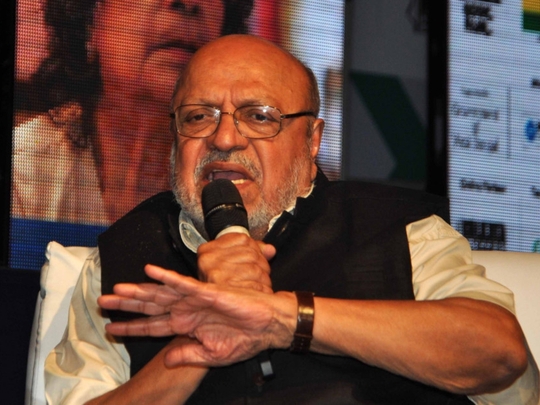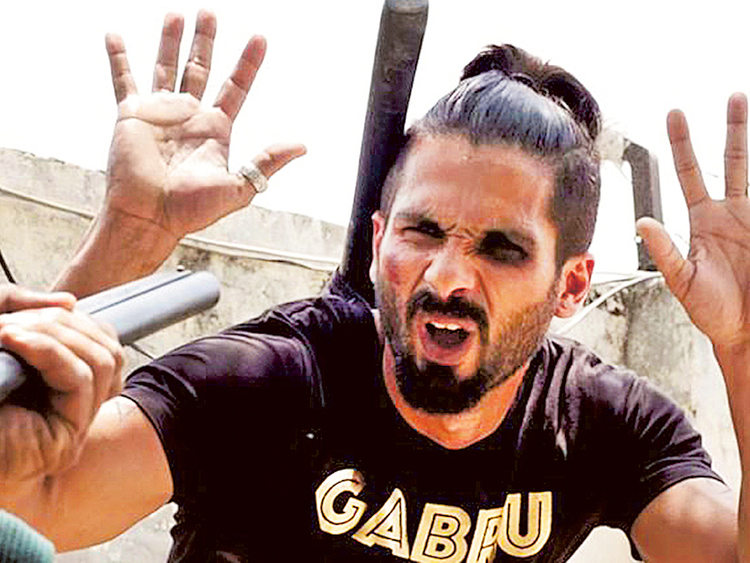
Dubai: It is the Indian public which should ultimately judge the controversial Bollywood film Udta Punjab (Flying Punjab) and draw their own conclusions, India’s multiple national award-winning filmmaker Shyam Benegal told Gulf News on Thursday.
“The way a particular filmmaker chooses to create a narrative or tell a story is very individual. You don’t necessarily have to agree with him — it’s a viewpoint that he is putting forward, and it is not necessary that you have to agree with that viewpoint. The public should make that judgement, along with the media and critics and the society at large,” Benegal, who also heads the federal government-appointed reforms committee of the Central Board of Film Certification (CBFC), told Gulf News in a phone interview from Mumbai.
Following the massive uproar over the alleged 89 cuts demanded by the CBFC, known in common parlance as the Indian censor board, and the ensuing standoff between CBFC chairman Pahlaj Nihalani and Udta Punjab co-producer Anurag Kashyap along with a major chunk of the Bollywood fraternity, Benegal watched an exclusive screening of Abhishek Chaubey’s directorial venture on Wednesday in Mumbai.
“The film is set in [the northern Indian state of] Punjab because Punjab happens to be a frontier state, where drugs that originate from outside India have the tendency to come in through,” Benegal said.
“The availability of drugs is also a serious problem for the state, and the government is doing a great deal to stop everything, but drugs have a way of getting into the country. Overall, Udta Punjab is a well-made film and a laudable effort,” he said.
On whether Nihalani’s insistence on deleting all reference to Punjab in the film, among several other demands, was justified, Benegal said: “I cannot comment on what the CBFC is doing, because I am chairing a committee by the government to look into the working of the CBFC itself and will make my own recommendations.
But by and large, at various points of time there are these kind of problems — the red flag goes up and everybody starts to feel that what is happening is wrong. But the fact of the matter is that these kind of debates happen in any democracy. You will often have such problems which you have to face as a democracy and there will be debates in the public domain about such issues — which is what is happening at this moment in time, within the film industry and outside of it.”
In January, the Indian government had set up the Benegal-led committee to reform the censor board, which has increasingly faced accusations of acting at the behest of Prime Minister Narendra Modi’s ruling Bharatiya Janata Party (BJP), apart from throttling creativity through its conservative and often inconsistent policies.
Apart from Benegal, the committee comprises filmmakers Goutam Ghosh and Rakeysh Omprakash Mehra, actor Kamal Haasan, Ogilvy & Mather co-executive chairman Piyush Pandey, film critic Bhawana Somaaya and National Film Development Corporation (NFDC) Managing Director Nina Lath Gupta.
Among its recommendations, the committee said the board should only be allowed to grant audience ratings or certifications and not censor content, except in rare circumstances.
Benegal said while the first tranche of recommendations submitted on April 26 have yet to be adopted, he expected an overhaul of the censor board once the final list of action points are submitted to the Indian information and broadcasting ministry next week. “One part of our recommendations have already been submitted, the other part of it is due before June 20, and certain recommendations will be made,” he said.
According to Benegal, the outcry surrounding Udta Punjab might have got India on the edge, but in the larger scheme of the debate surrounding the freedom of expression, “it is a problem with a single film and does not deal with deviations from any serious principles”.
“It just so happened that with this particular film, there are certain kind of fears and there are certain accusations,” Benegal said. “And the state also probably looks at it in a way that is not kind at all.”
Benegal, 81, an acclaimed filmmaker whose socially explicit films have dwelt on issues ranging from India’s class hierarchies to the sexual exploitation of women, interracial love stories and a trilogy on Indian Muslim women, has also served as the director of the NFDC.
The drama surrounding Udta Punjab took a farcical turn on Thursday with the release of the list of cuts demanded by the CBFC, which includes the renaming of a dog called Jacky Chain.
A copy of the order of cuts revealed a series of instructions including removal of all references to Punjab, swear and slang words and close-up shots of drug-taking. References to Punjab, including a signboard reading “Punjab” at the start of the film, and the names of several cities in the state are to be removed, as well as the words “election”, “MP”, “party”, “MLA” and “Parliament”.
Leading Bollywood actors, including Aamir Khan and Amitabh Bachchan also voiced their concern against censorship.
“This kind of thing reflects very badly on the CBFC. It’s a social film which talks about the drug addiction issue of Punjab’s youth. It has a good social message,” said Khan at a press conference in Mumbai. Khan also hoped that the Udta Punjab team, whose film is set for a June 17 release, would eventually “get justice”.
“I don’t think there’s anything that should be cut or not shown to the audience. It’s very important that filmmakers have a voice which is not throttled. In any society, the voice of the artiste should be free to speak what he wants to speak,” said Khan.
Bachchan, one of Bollywood’s most revered stars, also threw his weight behind Kashyap and team. “If you kill creativity, you kill the soul and that is all that we (artistes) have. That would be detrimental. I know that there are rules and regulations. That’s something that the government has to decide. But as an artiste and a creative person, all I can say is that don’t kill creativity,” he told the media.
Earlier, in a series of tweets, the film’s producer Kashyap described Nihalani as “a dictatorial man” and “an oligarch”.
“I always wondered what it felt like to live in North Korea,” Kashyap tweeted. “Now I don't even need to catch a plane.” Nihalani responded by accusing Kashyap of taking money from the Aam Admi Party, which triggered massive protests from both Bollywood and political parties opposed to the BJP, of which Nihalani has professed to be a great admirer.
— With inputs from Manjusha Radhakrishnan/Senior Reporter













